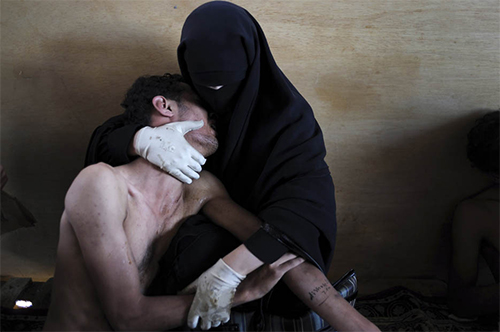Last week, the World Press Foundation announced its 2011 winners – and Spanish Photographer Samuel Aranda’s picture of a Yemeni mother consoling her wounded son was awarded World Press Photo 2011:

Ever since the announcement a vivid discussion started on photo Web sites and blogs, mostly criticizing the choice. For various reasons – some quite nit-picky, complaining about the off-centered framing or that it would lack journalistic requirements such as providing answers to the notorious „5 Ws“. Other voices challenge the choice because it could be read as yet another photo referring to the Pietà. That it would only show the jury’s bias and instead of calling it World Press Photo it should be called Western Press Photo. Or that it didn’t really stand for the womens active role in the Arabellion, instead „just“ showing a woman not only being clad in a traditional niqab but also once again „reduced“ to the traditional role of care taking.
Well, even though some of the remarks are interesting to read and well worth to think about I somehow feel we’re missing something here.
First: it’s a good picture. I can’t tell whether it’s the best but it sure deserves the attention. And even though it might not provide all answers it does raise questions – and that’s a good quality in a photograph.
Second: Without having read any of the interviews with Aranda, I assume it was quite a tense situation, in this field hospital that used to be a mosque. And I assume further that he saw the situation and made the picture – intuitively. I bet he didn’t think of the Pietà while he was there or even when he was filing it.
Most of all: maybe we should stop our navel gazing for a moment and listen to the people shown in the picture or other Yemeni bloggers and photographers. According to a BBC podcast or an article in published in the Yemen Times they are very happy about the choice and take it as a support to their cause – check out Russian Photos Blog that provides a good summary. Fatima Al-Qawas, the mother shown holding her son, is quoted saying: “It makes me very happy to see this picture, to see also that it has won such a prestigious award. It makes me happy and very proud: proud for being a woman, proud for being a mother, and also for being a Yemeni woman. I’m very proud that this photo is going around the world and many people have seen it and will continue seeing it. And especially it makes me even happier because it’s Western people who have chosen that picture for the award.”
Any further questions?
